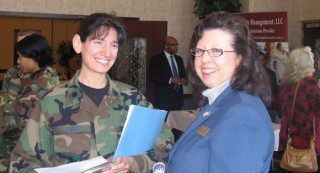Causes Include Lack of Awareness, Failure to Self-Identify as “Veterans,” and Veterans Services Designed with Men In Mind
Washington, DC – The Department of Veterans Affairs estimates that about 150,000 women will be transitioning out of the military over the next few years. However, too many of them fail to take advantage of the benefits and services for which they are eligible, according to a report released today by the Business and Professional Women’s (BPW) Foundation.
The report, “Joining Forces for Women Veterans,” shares among its key findings that: “Many women veterans do not access transition programs, services, and benefits that address their distinct needs,” primarily because they often are not aware of these resources, and because policies and practices related to benefits and service delivery often do not fit the distinct needs of women veterans.
“Joining Forces for Women Veterans” summarizes the findings of a day-long summit involving 80 leaders from the White House, federal agencies, veterans community, and the business and nonprofit sectors. Convened by BPW Foundation in Washington last fall, this group discussed the challenges facing women veterans and plotted a course for action. The event was made possible through the partnership of the McCormick Foundation and Disabled American Veterans Charitable Service Trust, and support by businesses and organizations.
The report builds upon the first-ever survey of women veterans, conducted four years ago by the BPW Foundation. After surveying 1,600 women vets in 2007, the group found that many programs and policies designed for veterans were set up to meet the needs of male veterans from a different era.
“Women veterans of all eras have been invisible for too long,” says Deborah Frett, CEO of the BPW Foundation. “Today there are more than 1.8 million women veterans in the United States and that number is growing exponentially. These ‘sheroes’ are four times as likely as non-veteran women to be homeless, they suffer a higher rate of unemployment than their male counterparts, and many are single heads of households with children. The report we are releasing today is a blueprint for a multi-year initiative to leverage public and private support to implement solutions for this distinguished group of women.”
Key Report Findings
Key findings of “Joining Forces for Women Veterans” include:
1) There is an economic and moral imperative for addressing the needs of women veterans. Women represent 15% of the military and are the fastest-growing population segment. The wealth of training and experience they bring to the civilian workplace as employees and employers is squandered when their unique transition needs are ignored.
2) Women veterans lack awareness of or access to benefits, services, programs that address their distinct needs for a number of reasons. Among them, many veterans’ services and programs were designed with men in mind, and many women veterans do not self-identify as veterans.
3) Efforts to address women veterans’ transition challenges must include a dual focus: support for women veterans and capacity-building for organizations. Business, government and community leaders lack knowledge about the women veterans employed in their organizations and living in their communities.
4) Actions and solutions that address women veterans’ transition challenges should be informed, holistic, collaborative, and community-based. Supporting women veterans’ employment transition, for example, requires companies, training organizations, and support systems for solutions. Public and private agencies should share the risks and rewards of supporting women veterans.
New Scholarships for Women Veterans
With the release of the report, the BPW Foundation announced scholarship opportunities to help women veterans get a leg up on their civilian careers. These scholarships will be offered through BPW Foundation and Joining Forces for Women Veterans’ partners Military to Medicine, and ed2go | Cengage Learning.
Joyce Leneave, a veteran from Cincinnati, Ohio, who last fall received a nursing scholarship from Military to Medicine said, “This is my opportunity to have a second chance at life… Military to Medicine makes it possible to study and learn while I raise my four daughters. I’m not sure I would be as successful in a traditional classroom setting.“
NOTE: To download a copy of the complete report, visit Business and Professional Women’s Foundation.
###
Business and Professional Women’s (BPW) Foundation is a 501(c) (3) research and education organization that is transforming the workplace for women and employers. Through groundbreaking research and as a convener of employers and employees, BPW Foundation leads the way in developing and advocating for polices and programs that “work” for both women and businesses. www.bpwfoundation.org.
ATTENTION READERS
We See The World From All Sides and Want YOU To Be Fully InformedIn fact, intentional disinformation is a disgraceful scourge in media today. So to assuage any possible errant incorrect information posted herein, we strongly encourage you to seek corroboration from other non-VT sources before forming an educated opinion.
About VT - Policies & Disclosures - Comment Policy




